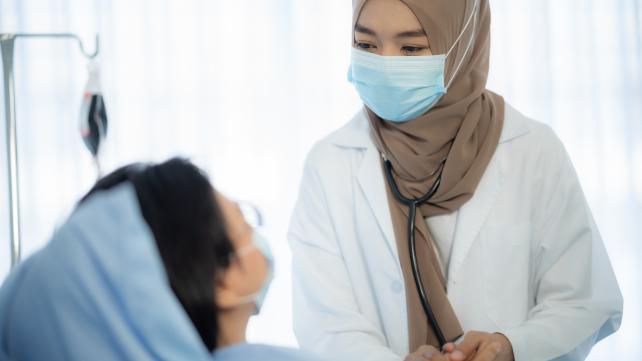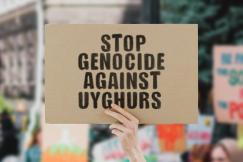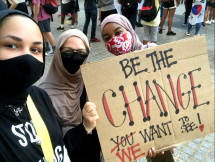
This year was indelibly marked by the COVID-19 pandemic, which brought death, disease, and economic hardship to the whole world. However, it also led to rapid advances in science, as well as long-ranging changes in every facet of life, from worship and work, to education, elections, and errand-running.
For Muslims, the pandemic led to developing unique ways of balancing faith, safety, and community service. Like everyone else, we faced this formidable test as we mourned our dead, cared for our sick, and grappled with the new challenges.
Among Muslim countries, Iran was hit especially hard in the first phase of the pandemic. Reporting its first cases in mid-February, it quickly became the world’s hotspot for the disease outside of China in March. This was attributed to a combination of American sanctions on the country, government incompetence, as well as censorship of critical information.
In the United States and in other countries, Muslims fared better, but still suffered and struggled, even as they stepped forward to serve.
Muslims Helping the World Overcome the Pandemic
- At this writing, the vaccine that is being rolled out in the U.S. and U.K. has been developed by the husband-wife team of Dr. Ugur Sahin and Dr. Özlem Türeci. They are both the children of Turkish Muslim immigrants who founded the German company BioNTech. It is currently valued at $21.9 billion. They beat larger and more well-known competitors in bringing the vaccine to market.
- In May, U.S. President Donald Trump named Muslim American Moncef Mohamed Slaoui chief scientist of “Operation Warp Speed”, a fast-track program to find a vaccine for COVID-19. Slaoui is a world-renowned immunologist who helped create 14 new vaccines.
- Professor Ali Mokdad, a statistical epidemiologist, and the Chief Strategy Officer at University of Washington, has been helping with pandemic planning through his regular projections. At the time of this writing, his institute has projected that by April 1 2021, unfortunately, 561,669 people will lose their lives in the U.S. He told Muslim Network TV that 50,000 of these lives can be saved if all Americans wear masks, remain physically distanced, and keep better hygiene. He recommends that, "We need to stay vigilant until 70 to 80 percent of us are vaccinated.”
- American Muslim Dr. Omar Ishrak, in his capacity as former Executive Chair of Medtronic, led the medical technology firm’s effort to speed up production of ventilators for treating COVID-19 patients. He is currently Chair of Intel Corporation’s board.
Muslim Heroes on the Frontline Fight COVID-19
- In the U.K., four Muslim doctors became the first physicians in the entire country to die of the disease, as they worked around the clock trying to save patients from it during the pandemic’s initial phase. A Muslim nurse was among the first in the profession to also die from the disease.
- Muslim Americans like Dr. Uzma Syed in New York and Dr. Omar Lateef in Chicago are just two of the many doctors on the frontlines in the U.S. Dr. Syed is a board-certified Infectious Disease specialist, Chair of the COVID-19 Task Force, and director of the Antimicrobial Stewardship Center of Excellence at Good Samaritan Hospital Medical Center in Jericho, New York. Dr. Lateef is president and CEO of Rush University Medical Center in Chicago. Under his leadership, the center received national recognition for its effective management of the COVID-19 pandemic. He was named one of the 50 Most Influential Clinical Executives for his work by Modern Healthcare.
- A 2012 study estimated that there are more than 50,000 Muslim physicians in the U.S. They also face Islamophobia, something that was documented even before the pandemic. This is happening in the U.K. as well, according to the British Islamic Medical Association. Although Muslims in the U.K. make up only five percent of the population, about 10 percent of all doctors in the country are Muslim.
- Muslim doctors, nurses, and other medical personnel fasted in Ramadan in April and May, at a time when, due to COVID-19, hospitals were full, workloads were unprecedented, and they faced their own fears about getting infected.
- A number of Muslim medical personnel who live away from their families were unable to celebrate Eid with them.
- In Canada, in the province of Saskatchewan, Chief Medical Health Officer Dr. Saqib Shahab was celebrated for his calmness and reassurance in the face of the COVID-19 crisis, as well as his sweater vests, even as he faced prejudice in some corners by those who opposed measures to protect people from the disease.
- In December, South Africa’s Dr. Salim Abdool Karim was jointly awarded the 2020 John Maddox Prize with America’s Dr. Anthony Fauci, director of the U.S. National Institute of Allergy and Infectious Diseases. Dr. Abdool Karim is chairperson of South Africa’s COVID-19 ministerial advisory committee, which guided the government's response to the pandemic. The award honors one or two individuals who have served to promote sound science and evidence despite hostility.
- In the U.S., New York became a hotspot early in the pandemic, with overflowing ICUs and morgues - leading to harrowing scenes that shook America. The high mortality rate was attributed to the government’s incompetence, as well as its refusal to take the disease seriously. According to the Institute for Social Policy and Understanding, Muslim New Yorkers make up more than nine percent of the city’s medical doctors and over 12 percent of the state’s pharmacists. Muslim doctors see over five million patients, and Muslim pharmacists fill close to 9.6 million prescriptions per year.
- The U.S. Centers for Disease Control (CDC) found that Hispanic and Black Americans are 2.8 times more likely to die from COVID-19 than White Americans. African-Americans make up one-fifth of the American Muslim community. In response to this greater risk to Black Muslims, the Muslim Wellness Foundation and the Muslim Anti-Racism Collaborative launched the National Black Muslim Covid Coalition in March.
- In the U.K., the highest age-standardised mortality rates of deaths involving COVID-19 among religious groups were found in Muslims, with 198.9 deaths per 100,000 males and 98.2 deaths per 100,000 females.
“Reinventing” Ramadan, Eid, Juma Prayers, and Hajj
Scholars, Imams, and leaders swiftly began developing ways to handle Islamic worship and the religious life of their communities in a way that limited physical contact and respected COVID-19 protocols. It was a struggle in a community used to hugs, handshakes, and shoulder-to-shoulder prayers. But they met the challenge with determination and a commitment to the health and well-being of all.
- Virtual Khutbas: Congregational Friday prayers in mosques were cancelled for several weeks in countless Masjids worldwide. They were replaced by virtual Khutbas. Once Ramadan began at the end of April, Taraweeh prayers were also canceled, followed by Eid prayers for both Eid-ul-Fitr in May and Eid ul Adha in July.
- Pre-registration with apps and other conditions: When Masjids did open with restrictions, many adopted an app-based, pre-registration system. This issued a barcode to limit attendance at mosques in order to maintain physical distancing protocols. Some Masjids checked worshippers’ temperatures at the door, had them bring their own prayer rugs, enforced mandatory mask-wearing, as well as a six-feet distance between attendees during prayer. An additional measure was thorough cleanings and disinfection after each of the five daily prayers.
- A number of Masjids also established a system of contact tracing: if someone who attended the mosque later tested positive for COVID-19, worshippers who were also present on the same day and time would be informed and they would be advised to get tested as well.
- The cancellation of Taraweeh prayers hit Masjids hard. Ramadan is an important time for charity and fundraising for Muslims around the world. According to one report, Masjids in the United States raise up to 30 percent of their annual revenue in the month of fasting. That is when attendance is generally higher than during the rest of the year, and Muslims tend to donate larger amounts to charity.
- The shift to online congregational prayers, services, and programs benefitted Muslims who, due to disability or other challenges, are not normally able to attend the Masjid in person.
- Hajj: COVID-19 affected Hajj in July, when Saudi Arabia announced that it would restrict admission to the pilgrimage to only 1,000 pilgrims of various nationalities already living in the country. It was the first time in Islamic history that foreign visitors had been barred from performing Hajj.
- Muslim non-profit organizations also reeled from the pandemic, as they awaited the dire news of a wave of closures. In response, the American Muslim Community Foundation opened the Covid-19 Response Fund for Nonprofits in April. This was an online crowdfunding campaign that raised $100,000 for 17 Islamic organizations. The grants ranged from $1,000 to $66,000.
- Virtual Classes: In the U.S., Islamic schools, both full-time and weekend, also moved online or to hybrid classrooms that combined online schooling with part-time, in-person attendance. As with other schools, the move to online schooling led to a decline in enrolment. Some artists and trained teachers joined together to offer innovative, interactive, work-based online classes to overcome children zooming out.
Deceased Declared Martyrs: Burial Rules Adapt to COVID-19
- Islamic scholars gave Fatwas early on that those who died of COVID-19 are to be treated as Shaheed (martyrs), as per Prophetic hadith.
- Muslim funeral directors faced the challenge of preparing and burying the bodies of COVID-19 victims in a way that maintained Islamic requirements of burial while respecting restrictions on touching the deceased. The Canadian Council of Imams published a guide on how to do this. Some advised performing Tayamum over the body instead of washing with water if there is a risk of infection. Others noted that since the deceased are Shaheed (martyrs), they can be buried in body bags without need for pre-burial washing.
- Scholars also recommended performing the funeral prayer outside of the Masjid to maintain physical distancing, and limiting the number of attendees.
- In Sri Lanka, Muslims struggled to convince the government not to forcibly cremate the bodies of Muslims who have died of COVID-19. The government requires the families to bear the cost of cremation, which typically amounts to around LKR 50,000-60,000 (approximately $270 to $325 US dollars) at a time when many families are struggling financially due to the pandemic. The Sri Lankan government’s chief epidemiologist, Dr. Sugath Samaraweera, has claimed that burials would “contaminate ground drinking water”. This is in opposition to the guidance of the World Health Organization, which notes that victims can be buried or cremated. Over 185 countries allow for the burial of COVID-19 victims.
- It is important to note the context of the situation in Sri Lanka: Anti-Muslim riots in 2018 exploded after a buildup of tension between the majority Sinhalese Buddhists and the Muslim minority in the country. This has been due to a number of factors, including the growing Muslim population, which is seen as a threat by the Buddhist majority. As a result, Muslims have come under suspicion and faced profiling and harassment by the government.
Increased Muslim Charity and Philanthropy Worldwide
- Muslims in the U.S. and around the world pushed back hard against the hunger and misery caused by the pandemic by giving more not only in charity, but by personally volunteering to make masks, serve food, reach out to isolated neighbors, and do much more.
- Zakat came to the fore as a way to provide for those struggling in the pandemic. In Pakistan, where Zakat is mandated and collected by the government (one of only six Muslim countries with such a system), many Pakistanis gave far more than the required 2.5 percent of Zakat as COVID-19 spread. Even those who didn’t earn enough to qualify for Zakat offered as much charity as they were able to.
- With Ramadan falling in April, during the first few weeks after lockdowns and other measures to protect from the pandemic began, Muslims in America and around the world shifted their charitable efforts toward COVID-19 relief.
- Islamic Relief USA, allotted $1.9 million in funding across the country, helping preserve essential social services programs administered by Masjids and social service organizations to meet increasing demand stemming from the pandemic. Zakat Foundation, like other non-profits, provided medical supplies, financial assistance, food packages, and hygiene kits in America and around the world. ICNA Relief established a national helpline, among other efforts, as well as a system to offer teletherapy to those struggling with mental health during the crisis.
- The U.K.-based charity Muslim Aid, responded similarly. But they were just part of the many Muslim community efforts to serve those in need, ranging from befriending the isolated and elderly, supporting refugees, offering childcare to single parents, and feeding the homeless quickly, efficiently, and on a huge scale.
- Providing personal protective equipment (PPE) became a key priority, as front line workers experienced shortages early in the pandemic. The National Muslim Taskforce on COVID-19 initiated the National Muslim Mask-Making Campaign. The project coordinated efforts between Muslim communities across the U.S. to provide a platform for those interested in volunteering to connect with or start local groups that made masks.
COVID-19 Inadvertently Introduces Islamic Hygiene Methods
Panic buying resulted in toilet paper shortages in the United States, Canada, Australia, the U.K., and other countries as COVID-19 hit. This led to a push for other methods of toilet hygiene, including the Islamic practice of Istinja, as well as a spike in sales of bidets.
Indians Falsely Blame Muslims for Spreading COVID-19 Intentionally
The pandemic became another excuse for Islamophobia by India’s Hindu nationalist government under the leadership of Prime Minister Narendra Modi. This was in the context of outrage and outcry over bigoted legislation like the Citizenship Amendment Act and the National Register of Citizens. These laws specifically target and marginalize Indian Muslims, stripping them of citizenship and rights. The term “CoronaJihad” was coined to blame Muslims for spreading the disease in the country intentionally. This translated into calls for social and economic boycotts of Muslims, as well as physical attacks on them, including on volunteers distributing relief material.






Add new comment